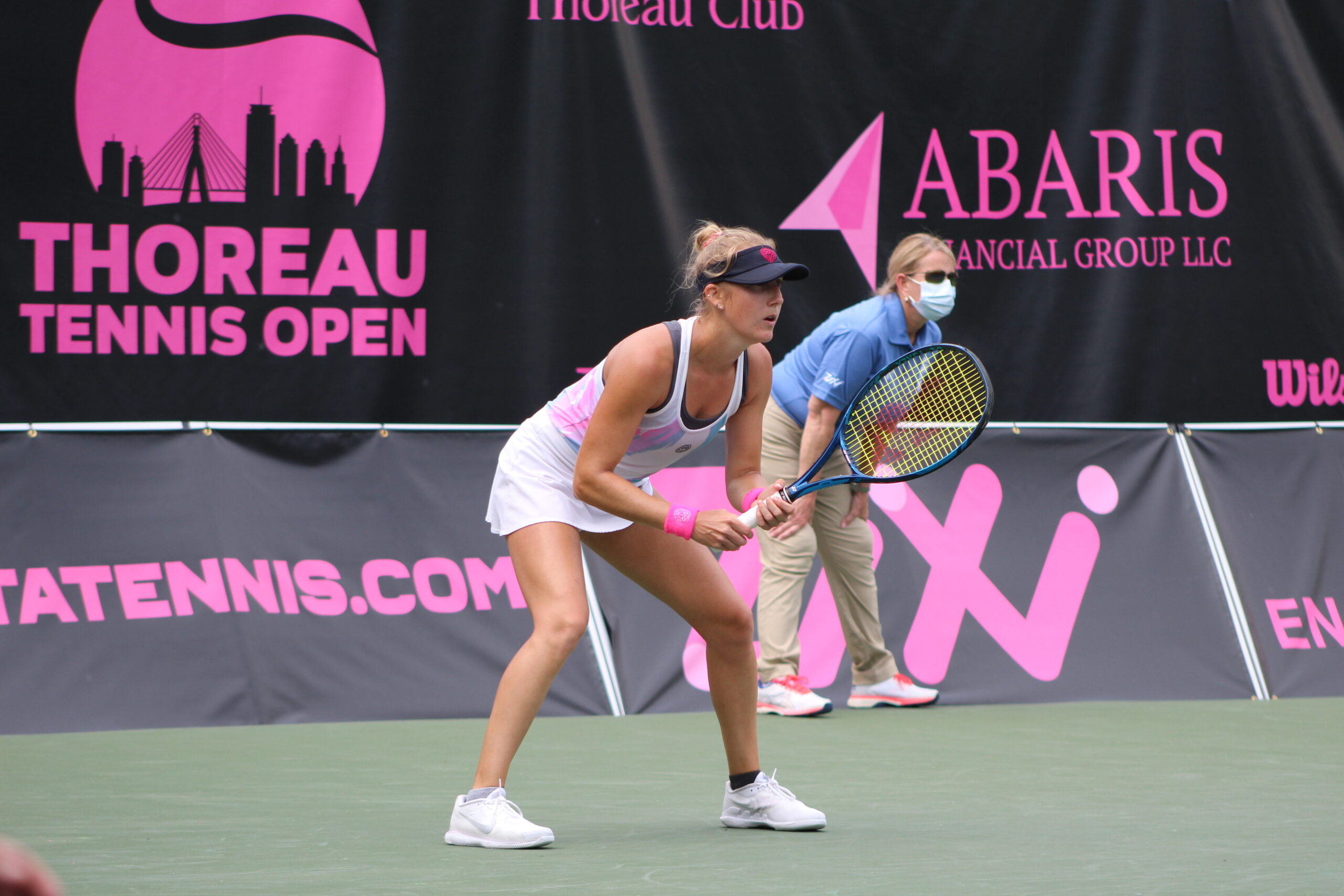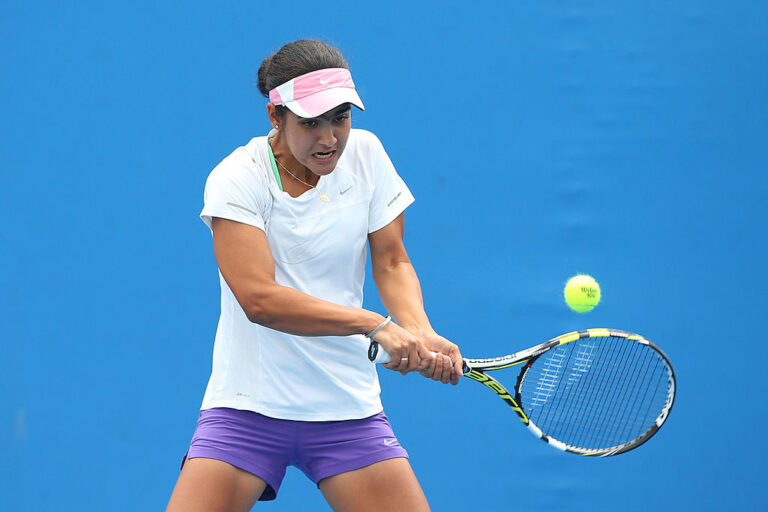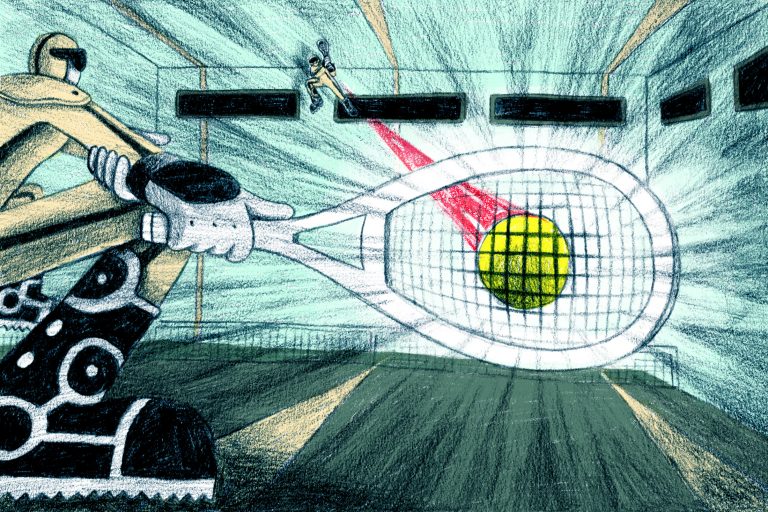The Other Opponent: The Mental Health Challenges of Professional Tennis
Why this matters
For a player trying to move up the rankings in professional tennis, stress and anxiety and bouts of self-doubt add more challenges to the physical toll of traveling the globe and finding places to compete week to week.
“You get depressed for the first two days returning home and the first two days on the road, too?”
I thought I was the only tennis player who struggled with this part of tour life. I’m talking with one of my best friends in professional tennis, Taylor Ng, a Dartmouth University graduate who worked on Wall Street for two years before pursuing a professional career. Today, she ranks around No. 650 in the world.
We catch up and each ask how the other is doing. More importantly, we ask, “Where are you?” Both of us pause and laugh. For a moment, neither of us can remember the time nor the place we are. This is normal. After all, we change countries week to week. I often wake up wondering where I am.
Coming Home
On this day, however, I’m finally returning home after one month of being on the road. Coming home brings on so many emotions, making players like myself hyper-aware of the instability that professional tennis can bring. It’s a reminder that even your closest friends and family can’t fully understand your life and experiences. It means realizing that the world you leave in order to chase ranking points continues on without you – and that while you’re gone, you’re missing out on important events and moments.
Every time I come home, my nieces and nephews are impossibly bigger. When I’m traveling, I sometimes avoid FaceTiming my family on Friday evenings – because I know they are all out to dinner. They call me anyway. I put on a smile for them, even though I’m sad that I can’t be at my favorite restaurant, too. I snap myself into being present, focused on where I am and what I’m doing. Daydreaming can make me homesick, so it’s better not to.
When talking to the people closest to me – or anyone, really – I constantly remind myself to not sound ungrateful. As a professional athlete, I don’t work a traditional 9-to-5 job. In many ways, I’m fortunate. But at the same time, trying to make it in my sport is anything but glamorous. Tennis pros have a need to be understood when expressing how lonely, how unrelatable, and, for players ranked outside the top 250 or so, just how scrappy our lives are. And that need is often unmet.
So coming home can be unsettling. Even if you’re home for only a week, it can take a few days to adjust – to see where I fit into the schedules and routines of my family, friends, and boyfriend. Just when I start to feel comfortable, it’s time to leave again. Depression and anxiety creep in. I’ll make up a hundred reasons to delay, knowing in my heart that if I want to be successful in tennis, I can’t afford to be anything but committed to my career.
Still, I consider myself lucky. I love tennis. I can’t imagine what it’s like for players who are doing this for their parents, coaches, or national federations.
Hitting the Road
The best way I can share and explain the mental health challenges of professional tennis is to walk through a typical trip. Finding the balance between competing enough to improve, win, and move up the rankings while maintaining your physical health through training blocks at home can be difficult – especially at the beginning of your career. In our sport, there is no real offseason. A missed tournament opportunity can be career-changing. For this reason, I usually travel four to six weeks at a time. Sometimes, I’m gone for eight weeks straight – by myself.
While training at home, I’m trying to figure out where in the world is going to be the best place for me to play. I could end up literally anywhere, from Africa to South America, if I let the International Tennis Federation system choose for me. But I don’t have that luxury. Money is tight, and booking a flight with just under one week before a trip is expensive.
Sometimes, however, I’ll take a chance. I recently decided to play a series of tournaments in Brazil. I booked a one-way flight for nearly $1,000 and started my research on how I will get from city to city by bus or plane each week. I am really hoping that I can tag along with other players. Even though I am lucky enough to have financial support from sponsors and family, I coach and write to support myself as much as I can. That makes my days longer and more tiring, but it takes some of the pressure to win off my shoulders.
Travel Time
I have 40 hours of travel ahead of me. Sixteen of them will be on a plane. While my flight anxiety has improved, it’s not a condition that makes my profession easier.
When I arrive in a new country, there’s a lot to feel anxious about. I often will have a two- to three-hour car ride with a driver who doesn’t speak English. I speak Spanish, but that doesn’t always help. I have little to no cellphone service, so I ask my boyfriend to track my location, if he can, to make sure that I am actually heading to my final destination. I start to think of all the ways I would escape if I was kidnapped. I remind myself that I’ve taken a three-hour taxi ride in Tunisia along the Algerian border – an area that has travel warnings for terrorism – and that things turned out fine. Oddly enough, this comforts the pit in my stomach.
Ultimately, you hope that you get in the car with someone who is who they say they are, someone connected to the tournament. There’s no real way of knowing. It’s mentally draining.
I make it to my destination of Piracicaba, Brazil. The ride was relatively pleasant. After not eating for hours, I am excited to arrive at the hotel. Then I realize no one here speaks English, lunch is closed, and I don’t know where or when I will get my next meal. I’m sure I will eventually eat. It’s just a matter of having time to find a solution before practice. Over the next week, I realize my Portuguese is terrible; every time I order food, it’s a mystery.
Things change when I finally meet up with a friend.
Making Friends
There’s something strange about life on tour that you notice right away: Everyone makes friends fast. Really fast. Relationships move from strangers to best friends in a single week. I’m not exaggerating.
At first, I thought this was weird. Then I realized it’s not. These friendships are real. They form out of a mutual desperation to be understood and to not be alone. You end up living with strangers in tiny rooms, experiencing things that no one in the rest of the world is going through. Of course you bond. It’s a survival skill.
Sometimes, these friendships last. Others come and go as quickly as you bonded. I’ll never forget making friends so quickly with one girl on tour who was ranked around 250. I was somewhat honored that she cared to talk to someone without a ranking at that time. Today, she is closer to the top 100 and probably wouldn’t even look my way if we crossed paths. I’m not offended. This is how it goes on tour.
Here in Brazil, I’m lucky. A good friend of mine, Julia, is here to help me. Our relationship is not a relationship that survives because you have no one else. She’s a true friend. And she knows I’m struggling with the language barrier. I also make friends with Magdalena, a player from Macedonia. She’s kind enough to invite me to dinner, and we bond immediately over good Brazilian food. This kind of bonding is common, as many of the resorts at the entry-level tournaments will give you food poisoning.
Time for Tennis
The tournament week is starting, and match preparations are finalizing. At dinner with Magdalena and her coach, I tell her how jealous I am that she gets to travel with a coach. That can be a huge advantage – not only because you have someone watching you play and letting you know what you are doing right and wrong, but also because you simply have someone there to support you in person.
This is one of my biggest struggles. I call my coach, who is located in Boston, after my matches, but sometimes I can’t even tell him what went wrong. It’s one thing to play a match and another thing to see it.
Then, there are times when I don’t even want to call. I don’t want to tell my coach that I lost because I struggled with confidence. This feeling often drowns tennis players. No one wants to admit it out loud, usually for two reasons:
Doubts and anxieties can be detrimental to performance, so many of us subscribe to the Fake It To Make It method: If you can pretend your nerves aren’t there, then are they, really?
On the other hand, talking about your anxiety – which can be healthy! – also can signal to your coaches, sponsors, or opponents that you’re struggling. If they don’t believe in you, or if they perceive “weakness,” it can be a disadvantage on and off the court.
This typically leads to a vicious cycle of overthinking. You convince yourself that you are worthy, and then you get mad at yourself when you show signs of cracking. You flip back and forth emotionally. It can consume you.
Sitting with Magdalena at dinner is refreshing. She gets right into it. I tell her I am writing a piece on anxiety and tennis, and she immediately says, “Now let me tell you, why don’t we talk about this more?”
She starts talking about a feeling that I know all too well. It’s the worst kind of anxiety on the court. The kind that impacts your body’s ability to move. All of a sudden, you really believe that you don’t know how to play tennis. This is weird for us, considering that we’ve played tennis all our lives.
She says, “My arm goes numb and then tight.” I think about my best friend in college when she says this. My friend had the “serving yips,” which is what we call it when you can’t release the ball on the toss properly, causing it to go all over the place.
I come back to Magdalena’s experience. I wonder, does she really feel this to the same level that I do sometimes? It’s hard to tell. On the inside, it feels terrible. But on the outside, you often can’t see that a player is going through it.
The Night Before
I return to my room following dinner. I am grateful because, for the first time in a long time, I am excited about my match. Normally, I am scared. My lack of confidence comes from two back tears, a broken wrist, a broken foot, and ab strains. It also teeters because I care too much about whether people think I can make it. In my heart, I know I am capable. I get mad at myself for even giving doubters a second of my mental energy. We have none to spare. But this time, I am not scared of losing – or worse, telling all my friends and family that I lost. I am just excited to play.
I lie down in my bed to get a good night's sleep. An hour later, my body is covered in rashes and burns. Bed bugs. My body is one fire, but I remain calm. I won’t let this ruin my state of mind. I change rooms, do laundry, and sit on my new bed, reflecting on this moment. The mental challenges that come from trying to make it as a professional tennis player are severely underrated. Normally, this moment would make me cry. I would probably ask God why another thing has happened that may stand in the way of my success.
This time, however, I shake it off. I realize that this is why my coach gave me the advice he did when I started playing on tour: “It’s not about groundstrokes and serves. Everyone on tour can play. It’s about being mentally strong. It’s about having some good fortune. And it’s about who can stick it out in the end.”
I remember this and go to bed, accepting the challenge. Tomorrow is match day.
Please see our list of Mental Health Resources if you are seeking information or assistance regarding mental health.
Monthly Issue
Mental Health: A New Priority in Sport
Athletes continue to tell us they are not OK with their actions and words. In response, the sports industry has acknowledged it can and should be doing more to support the people who are its lifeblood, from athletes to coaches and beyond.
Sport is both reckoning with its roots, uncovering how history and habit created circumstances that don’t suit everyone who competes, as well as navigating new territory during a time of unprecedented strain on our mental well-being. By making mental health a priority, sport has an opportunity to confer a host of benefits supporting mental wellness and to be more safe, inclusive, and inspiring.




